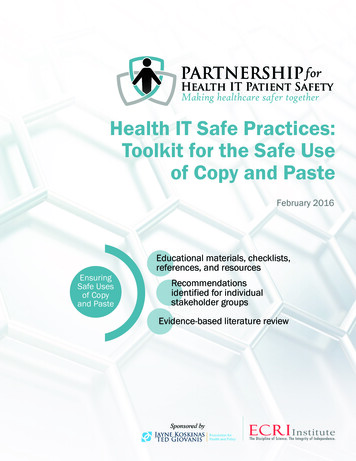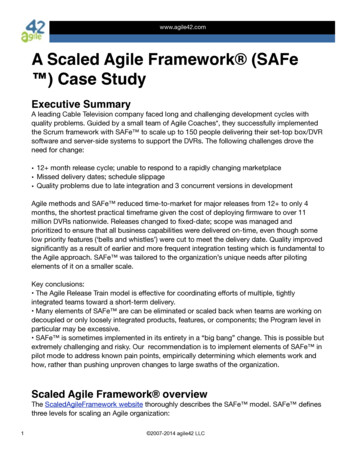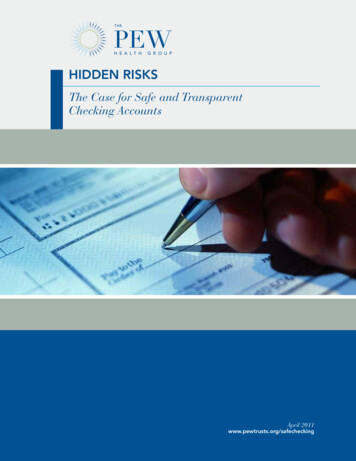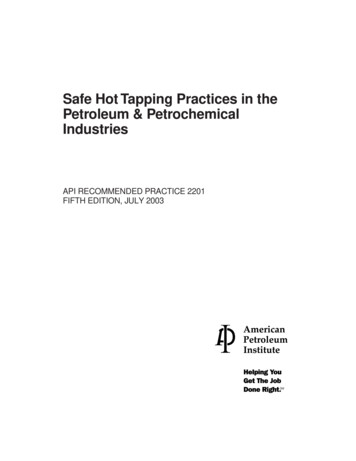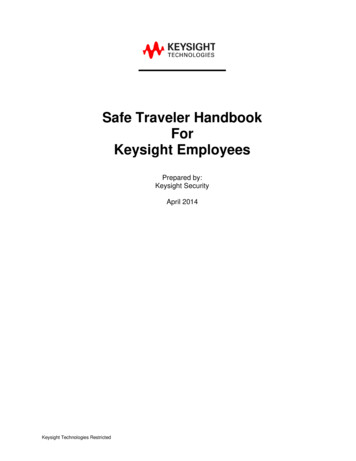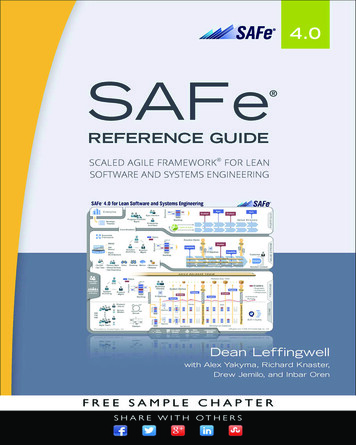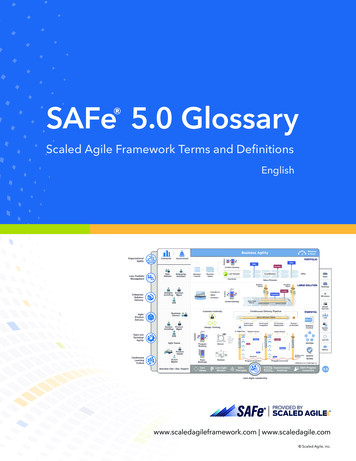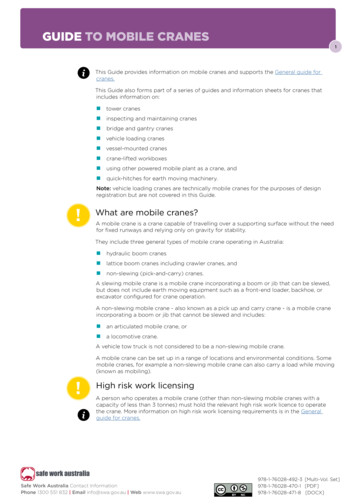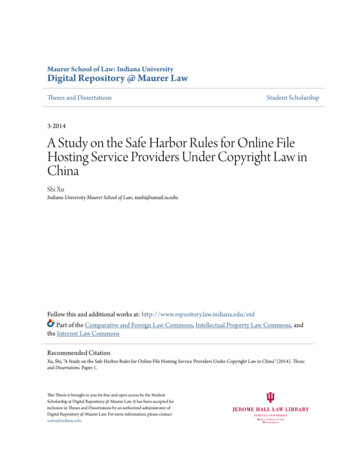
Transcription
Maurer School of Law: Indiana UniversityDigital Repository @ Maurer LawTheses and DissertationsStudent Scholarship3-2014A Study on the Safe Harbor Rules for Online FileHosting Service Providers Under Copyright Law inChinaShi XuIndiana University Maurer School of Law, xushi@umail.iu.eduFollow this and additional works at: http://www.repository.law.indiana.edu/etdPart of the Comparative and Foreign Law Commons, Intellectual Property Law Commons, andthe Internet Law CommonsRecommended CitationXu, Shi, "A Study on the Safe Harbor Rules for Online File Hosting Service Providers Under Copyright Law in China" (2014). Thesesand Dissertations. Paper 1.This Thesis is brought to you for free and open access by the StudentScholarship at Digital Repository @ Maurer Law. It has been accepted forinclusion in Theses and Dissertations by an authorized administrator ofDigital Repository @ Maurer Law. For more information, please contactwattn@indiana.edu.
A STUDY ON THE SAFE HARBOR RULES FOR ONLINEFILE HOSTING SERVICE PROVIDERS UNDERCOPYRIGHT LAW IN CHINAShi XuSubmitted to the faculty of Indiana University Maurer School of Lawin partial fulfillment of the requirementsfor the degreeMaster of Laws – ThesisMarch 2014
N{aurerSchoolof Lai.v,in parlialAcceptedby the lzrculty"IndianalJniversit.v"- 'l-hesis.1brthe degreeof 'hcsisCornrnittccMarshall A. LcaffcrScholarinDistinguislredPlopefil''Law anclIntellerctualIiniversityFellolvctateof thesis- March10.2014Submission
Copyright 2014Shi Xuiii
AcknowledgementsI want to say thanks to my advisor, Prof. Leaffer. I really appreciate that he isalways being so nice to me and is willing to take me as his apprentice. He alwaysshowed me the direction of my research when I felt helpless. And I also want to thankProf. Goodwin, she not only taught me how to think and write like a scholar, but alsogave me advice in life. Special thanks go to our warm office of Graduate LegalStudies, especially to Dean Davis. She always be so patient and takes care of me. Ireally appreciate all her help. And I also want to thank dear Lara, she is always sonice. Special thanks to Mr. Cheng.Thanks to my dear parents and grandmother, you always take care of me andgive me encouragements. Thanks to my grandfather, you will always be with me. Andthanks to my aunts and uncles, without your support, I could not keep tracing my goal.I love you all. Thank you so much.Shi XuFeb 25, 2014iv
A STUDY ON THE SAFE HARBOR RULES FORONLINE FILE HOSTING SERVICE PROVIDERSUNDER COPYRIGHT LAW IN CHINATable of ContentsChapter 1: Introduction . 1Chapter 2: The Overview of Internet Service Providers’ Secondary Liability andSafe Harbor Rules. . 42.1 The Relationship between the Secondary Liability and the Safe Harbor Rules . 42.2 File Hosting Service . 5Chapter 3: File Hosting Service Providers’ Liability and Their Safe Harbors inthe U.S. . 73.1 General Background . 73.2 Contributory Infringement and the DMCA §512(c)(1)(A)&(C) . 73.2.1 Actual Knowledge and Red Flag Awareness . 83.2.2 Materially Contribution . 113.3 Vicarious Infringement and the DMCA §512(c)(1)(B) . 113.3.1 Direct Financial Benefit. 123.3.2 The Right and Ability to Control . 133.4 Active Inducement of Infringement . 14Chapter 4: File Hosting Service Providers’ Liability and Their Safe Harbors inChina. . 164.1 The Overview of Online Copyright Infringements in China and Baidu Case . 164.2 Secondary Infringement and the Safe Harbor Rules. . 194.2.1 Instigating Infringement . 19v
4.2.2 Assisting Infringement and the Safe Harbor Rules . 214.2.2.1 Knowledge Condition and Take-Down Procedure . 224.2.2.2 Take-Down Notice . 474.2.2.3 Other Elements of the Safe Harbor Rules in China . 55Chapter 5: Global Study of Safe Harbor Rules . 655.1 The European Union E-Commerce Directive . 655.1.1 Liability Exemption of FHSPs . 655.1.1.1 Actual Knowledge . 675.1.1.2 No General Obligation to Monitor. 705.2 Japan . 715.2.1 Limitation of Liability for Damages . 725.2.1.1 Limitation of Liability towards Third Party Infringements . 725.2.1.2 Limitation of Liability towards TSP‘s Deleting Actions . 735.2.2 Demand for Disclosure of Identification Information of the Sender . 75Chapter 6: Conclusion . 77Bibliography . 80vi
Chapter 1: IntroductionChina established a legal system of copyright law over about a 30-year periodthrough adapting foreign copyright laws. The adapted copyright law may causeconflicts in practice in China because of the social environment, such as theConfucian culture, the level of economic development and political system. Duringthis short time, it was really hard for the Chinese to adopt the idea of ―copyright‖since they have a tradition of sharing information. And with internet companiesexpanding around the world and the coming of the age of ―user-generated‖ internetcontent, all countries face the issue of assigning liability when copyrightinfringements occurred on the internet.Chinese people are used to getting information and entertainment beingavailable for free on the internet. Under this circumstance, China, with the largestnumber of internet users in the world, may face more difficulties than other countriesconcerning the issue of internet copyright infringements. Because so many copyrightinfringements online occur every day, infringers cannot be located since they did notuse real personal information such as registering registration online.When a copyright owner finds financially difficult to pursue an individual foronline infringements, he or she might seek remedy from internet service providers. Toprotect the legal right of providers, in 2005, China adopted safe harbor rules from theU.S. Digital Millennium Copyright Act (hereafter DMCA), particularly U.S. DMCA§512. The content of this provision has been incorporated into a number of differentChinese laws, such as Article 36 in the torts law and Article 4 in the Interpretation ofthe Supreme People‘s Court regarding copyright disputes that involve computernetworks. However, the Chinese translation and interpretation of DMCA §512 variesfrom law to law, which causes confusions in practice. For instance, Article 22 of the1
Chinese Regulation on the Protection of the Right to Network Dissemination ofInformation is a nearly complete Chinese replication of DMCA §512(c). It states thatthe knowledge requirement of safe harbor rules is that internet service providers ―haveno knowledge of‖ and ―have no justifiable reason to know‖ the infringements on theirservers. On the other hand, in Article 36 of the torts law, the requirement is just ―toknow‖. These terms do not have a clear standard of review in China; thus, Chinesecourts face difficulties in deciding whether service providers can be protected by safeharbor rules.Further, promulgated on December 17, 2012, the Chinese Supreme People‘sCourt has a new provision for adjudicating cases involving infringement of the rightof dissemination on information networks. Although this provision provides a detailedstandard of safe harbor rules, some legal loopholes might cause problems in practice.For instance, China has introduced the concept of ―inducement infringement,‖ butonly provides a very general definition of this occurring when internet serviceproviders encourage users to infringe through language, recommending technologicalsupport, awards, points or other methods. It is hard for a court to judge whether aninternet service provider induced infringements based on this one concept.In this circumstance, this thesis tries to analysis each element of the safeharbor rules, critique the unclear standard of review of them, and examine the reasonsfor the current standard of the ―safe harbor‖ in China. In order to solve the current―standard‖ and ―implementation‖ problems, this paper advocates amending the law, tounify the rules and to establish a detailed standard of review by comparing the safeharbor rules of China with those of the rest of the world.Chapter 2 provides an overview of the relationship between internet serviceproviders‘ secondary liability and their safe harbor, and explains the service of2
internet file hosting. Chapter 3 explains each factor of the safe harbor rules forproviders of internet file hosting services under U.S. law by analyzing several casesinvolve these rules. Chapter 4 focuses on the safe harbor rules for Chinese providersof internet file hosting service. This chapter also looks at particular cases to examinethe unclear standards of review of safe harbor rules and suggests changes in theserules. Chapter 5 examines the EU and Japan‘s approaches in addressing the liabilityfor third-party copyright infringement of internet file hosting service provider. Finally,Chapter 6 proposes several ways for China to amend its current safe harbor rules.3
Chapter 2: The Overview of Internet Service Providers’ Secondary Liability andSafe Harbor Rules.2.1 The Relationship between the Secondary Liability and the Safe Harbor RulesThe online infringement of copyright law is almost always a ―corporate‖ work,since internet users could not act infringe without the help of internet serviceproviders. For instance, say a person bought a copyrighted book, took pictures ofeach page, and then uploaded the pictures in his storage space on the internet, whichis open to the other ―net citizens‖. In effect, the service provider cooperated in thisprocess. Yet because of fast-developing technology, the cost of this infringement ofcopyright law keeps decreasing and sometimes there is none. Another person mightsee the pictures of the copyrighted book online; he could download the files with asimple click of his mouse, and could then upload the files on his own space for othersto download. Basically, this person infringed copyright law without paying any fee.Given this dynamic, anyone could easily be a copyright infringer. However, it wouldcost a great deal for the copyright owner to seek compensation of the copyrightinfringement, particularly, if the first person registered his online file space with afake name, address, ID number, which would make it even difficult for the copyrightowner to locate the infringer for the purpose of a lawsuit.To protect the copyright owner, the rule of secondary infringement has beenestablished in many countries. By analyzing statutes and case law throughout theworld, we learn that the secondary or indirect infringement occurs when a party doesnot infringe direct directly but rather materially contributes to, facilitates, or inducesanother party‘s direct infringement with actual knowledge or reasonable awareness.The party‘s acts cause secondary liability.Scholars generally classify secondary liability into two kinds: contributory4
liability and vicarious liability, based on courts‘ decisions in these matters. 1Furthermore, some scholars believe there is a third kind – inducement liability. 2However, to ―facilitate the robust development and world-wide expansion ofelectronic commerce, communication, research, development, and education in thedigital age,‖3 American law felt it could not impose all the liability on internet serviceproviders, whose interests also need to be protected. Today, more and more countrieslimit liability for the internet service provider, which has no subjective fault accordingto the safe harbor rules. The U.S. Congress passed the Digital Millennium CopyrightAct; the Chinese Supreme Court established several Interpretations and Regulations indeciding whether internet service providers should be liable for their subscribers‘infringements; the European Union developed an E-Commerce Directive4 and Japanimplemented the Provider Liability Law 5 . Although the statutes vary, theirfundamental structure is the same: to provide internet service providers exemptionfrom liability for subscribers‘ infringing activities under several appropriateconditions, according to the safe
FILE HOSTING SERVICE PROVIDERS UNDER COPYRIGHT LAW IN CHINA Shi Xu Submitted to the faculty of Indiana University Maurer School of Law in partial fulfillment of the requirements for the degree Master of Laws – Thesis March 2014
